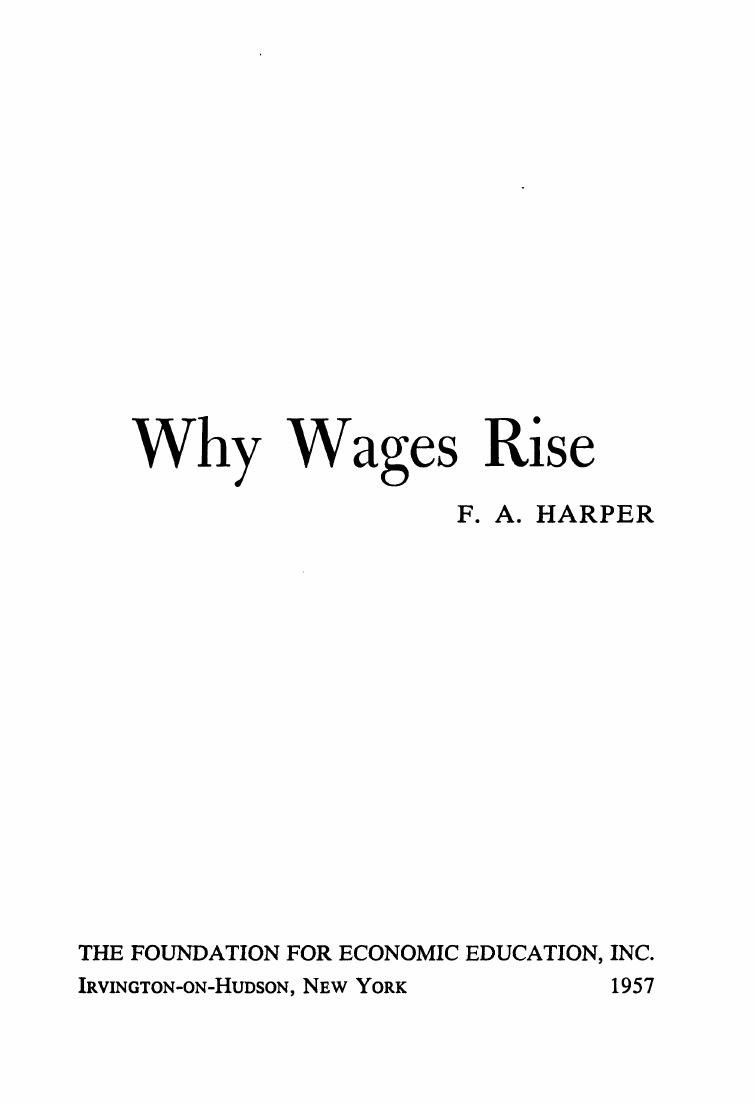Why Wages Rise by F. A. Harper

Author:F. A. Harper [F. A. Harper]
Language: eng
Format: epub, pdf
ISBN: 978-1-61016-473-3
Publisher: The Foundation for Economic Education, Inc.
Published: 1957-11-06T16:00:00+00:00
Service Charges by Fiat
But suppose I had bargained on a different basis, and said: “Since the protection of the potato patch is important to both of us, I will chip in along with you and pay an equal share of the cost of this general welfare. In other words, I will do all the work of protecting the patch and you will do all the other work of raising the potatoes. Then we will each pay half of each other’s income in return for half the product — each of us getting, at the end of the year, ten bushels of potatoes plus half of the service of having had them protected.”
This would still be unappealing to you, since the protection is worth nothing to you and you would not pay anything for it willingly. Why give up half your potatoes for nothing?
Let us assume, however, that by some device — though we are not here considering that device — it is decreed that this protection is “necessary”; that it must be provided for the “general welfare.” That decree overrules your objection without answering it. And so I become hired by decree. Under this situation we find that wages are still nominally at a level of $1.00 per hour for both of us. Yet the worth of the wage has been changed. Though nominally the same wage as before, when all the time of both of us was spent raising potatoes, it can’t possibly be worth as much as before because we have produced less.
A wage can buy no more than is produced. And under this new arrangement the two of us have produced only half as much as before, or 20 bushels instead of 40 bushels of potatoes. So our wages will now buy only 20 bushels of potatoes — plus protection against the mountain lions, of course. Our wages have in this instance, then, lost buying power in proportion to that part over which there was loss of free choice in spending — half the total yearly wage of our little community. The loss was the amount of forced purchase of a service worth nothing to you.
Nor would this loss of buying power have been eliminated by diluting our money to the extent of the protection cost. This would only have raised prices sharply for the reduced amount of production. No matter what is done to the money, only a miracle can turn 20 bushels of potatoes into 40 bushels.
Download
This site does not store any files on its server. We only index and link to content provided by other sites. Please contact the content providers to delete copyright contents if any and email us, we'll remove relevant links or contents immediately.
Bullshit Jobs by David Graeber(4176)
Radical Candor by Kim Scott(2709)
I Am Right, You Are Wrong by Edward De Bono(2437)
23:27 by H. L. Roberts(2243)
Nomadland by Jessica Bruder(2056)
Average Is Over by Tyler Cowen(1843)
The Conflict Resolution Phrase Book by Barbara Mitchell & Cornelia Gamlem(1768)
Out of Our Minds: Learning to Be Creative by Ken Robinson(1727)
High-Impact Interview Questions by Victoria A. Hoevemeyer(1685)
The Ideal Team Player by Patrick M. Lencioni(1632)
An Everyone Culture: Becoming a Deliberately Developmental Organization by Robert Kegan & Lisa Laskow Lahey(1630)
Who Moved My Cheese?: An Amazing Way to Deal With Change in Your Work and in Your Life by Johnson Spencer(1628)
The Asshole Survival Guide by Robert I. Sutton(1596)
Automatic Society by Bernard Stiegler(1546)
Unleashed by Anne Morriss & Frances Frei(1535)
Who by Street Randy & Smart Geoff(1497)
42 Rules of Employee Engagement by Susan Stamm(1461)
96 Great Interview Questions to Ask Before You Hire by Paul Falcone(1442)
Fish! by Stephen C. Lundin(1397)
